Majors & Minors
As a GRL student, you are able to combine your interests into one programme - whether you like psychology or economics, philosphy or climate science, you're given the freedom to build your own curriculum!
➡ Overview
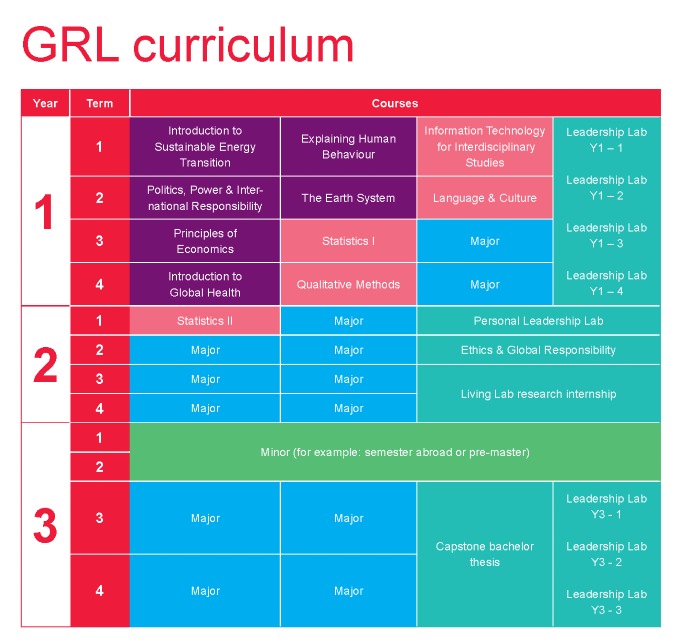
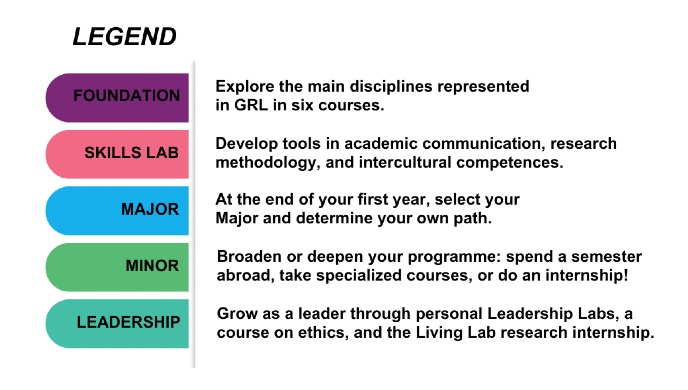
➡ Major
Your Major, which you choose at the end of your first year, is the biggest part of your GRL journey (worth 95 ECTS). Each Major consists of two main tracks. It is also possible to combine your fields of interest by taking some courses from a different Major - for example, you could Major in Politics, Philosophy and Economics, while also taking a few Psychology & Global Health courses. Our dedicated GRL study advisor Maaike is there to help you figure out your path!
Energy, Ecology and Climate
Coordinator:
prof. Anne Beaulieu
The changing climate is one of the biggest threats to development and impacts the most vulnerable peoples and ecosystems on the planet. The aim of this major is to connect complex issues to an understanding of Earth System Science, Environmental Science, Energy Transition, and Science and Technology Studies.
Learn about the Earth System and climate change and environmental degradation; the dynamics of energy systems at different scales; and the current challenges for biodiversity & sustainability. You will also learn about interactions between SDGs, about how to connect interdisciplinary scientific knowledge relevant to global challenges, about the role of data science & socio-political dimensions of sustainability, and about transition theory.
|
Tracks
|
Course examples
|
|
Earth & Environment
|
Climate Data & Services
|
|
Energy Transition
|
Petrocultures in Transition
|
Psychology and Global Health
Coordinator:
dr. Josefine Geiger
Human behaviour is one of the leading causes of global challenges, and these challenges in turn affect individual and collective well-being. Learn to understand the (human-driven) antecedents of global challenges and how to reflect on the interaction between individual and contextual factors that affect behaviour, and the real opportunities for decision-making (e.g. cultural, social, and institutional influences).
In addition, we will equip you with the necessary tools (theories, methods, approaches) to develop solutions and interventions addressing the SDGs, to help improve collective and individual well-being.
|
Tracks
|
Course examples
|
|
Psychology
|
Applied Social Psychology
|
|
Global Health
|
Worldwide Analyses of Global Health Issues
|
Politics, Philosophy and Economics
Coordinator:
dr. Elise Rouméas
Solving global challenges requires adequate policy frameworks with accountable and transparent institutions at all levels. The aim of this major is to help you develop the knowledge and tools to understand and research the complex systems of power, democracy, institutions, societal change, economics and policy.
In addition, you will gain insight into their mutual connection and relation to the other GRL tracks, and in relation to your own place within these systems.
|
Tracks
|
Course examples
|
|
Political Science
|
Global Injustice: Philosophical Perspectives
|
|
Economics
|
Behavioural Economics
|
➡ Minor
During your fifth semester, you have the opportunity to enrich your programme with an exchange, internship, minor or pre-master. This allows you to gain academic experience and perspectives outside of Campus Fryslân, or learn how to apply the knowledge you have gathered so far to real-world challenges. You can explore new areas of interest, for instance, if you are interested in entrepreneurship or tourism, or specialise in a field you would like to pursue after you have obtained your degree. Here's some examples of student stories:
Ellis Mourits - internship
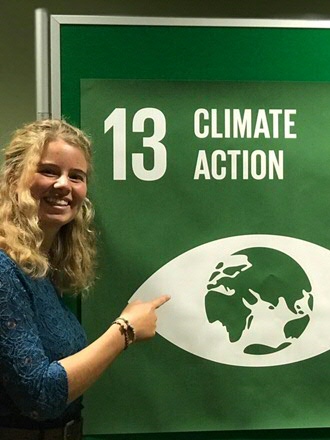
Internship at the Municipality of Leeuwarden
Ellis Mourits
During my minor, I got the chance to do an internship at the municipality of Leeuwarden with the main task of organising the Week of the Circular Economy in Friesland. This was done in collaboration with other organisations in the province. My tasks included planning and leading meetings, keeping an overview of the events being organised, drafting project ideas and promoting events. All together, we set up over 20 events and reached an estimated 1200 people during the Week of the Circular Economy. As I worked together with a very diverse group of people and organisations, I got a good understanding of the different roles that organisations in the province have with regard to circularity, in particular the role of Frisian municipalities and provincie Fryslân. Moreover, I practiced and developed organising, planning and communication skills.
For me personally, I became quite aware that there are still a lot of things that need to be done to transition from a linear to a circular economy. Embedding circularity in governments and educational institutions is an enormous challenge and happens step by step. This sounds a bit negative and has been kind of a reality check compared to the big ideas and visions that we bring forward in our studies. However, it is also motivating. During the internship, I got to know a large group of people that are busy with a similar mission in this region. Beforehand I only knew roughly what was going on in Friesland, but I did not know that there were so many opportunities. I also did not know that I could actually join them and bring a valuable contribution with my motivation, effort and knowledge about sustainability. This has definitely opened up my eyes and was overall a great experience!
Ester Alda Bragadottir - study abroad
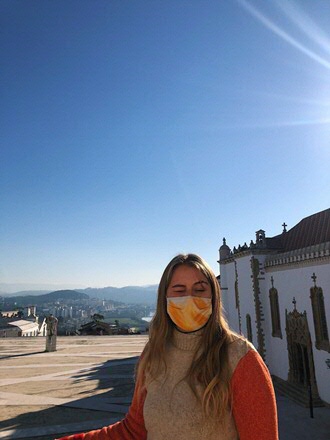
Exchange to the University of Coimbra in Portugal
Ester Alda Bragadottir
My name is Ester Alda and I have been living in Coimbra in Portugal this semester. Due to Covid-19 I was the only third-year student going on an exchange this semester, which has been an experience that I will be forever grateful for. Living in Portugal for around five months, and studying at one of Europe’s oldest universities, has been a total adventure from the beginning to the end.
I moved into a student residence, on a floor with six other Erasmus students, in a house called “the Yellow house” which I thought sounded great. I saw from the start how lively the city is, full of students, although I have been told that this year has been very far from its usual life, understandably. I was able to take a Portuguese A1 course, alongside politics and economics courses. Those courses were enjoyable and I learned a lot. Some of the classes were, however, quite different from what I am used to at UCF, and sometimes I missed the interdisciplinary approach to the subjects at hand.
Before moving I had heard that the Portuguese are very friendly and relaxed, which I agree entirely with after having stayed here. By mid-October, I was already quite familiar with the city, had made great friends, and was enjoying the University. Then I, and my housemates ended up being at the wrong place at the wrong time and we managed to catch the famous Covid-19. Three weeks inside the Yellow house followed, where we relaxed and recovered. The fresh air was even fresher after that quarantine and since then life has been quite stable here in Coimbra.
During my stay, I have been able to go to the beach, go hiking, join strikes, and I have visited the major cities, enjoyed the sun, and briefly got to know the Portuguese life, and I have loved every minute of it. I have made new friends for a lifetime, and my horizons have widened. I will be back in Portugal, hopefully, many times and I will miss this beautiful country. I am well aware of the privilege it has been for me to go on an exchange during a pandemic, and I cannot express how thankful I am for this experience. Nevertheless, I am also extremely excited to return to the Netherlands and finish the program with my great friends at UCF.
Helena Nielsen - minor at another faculty
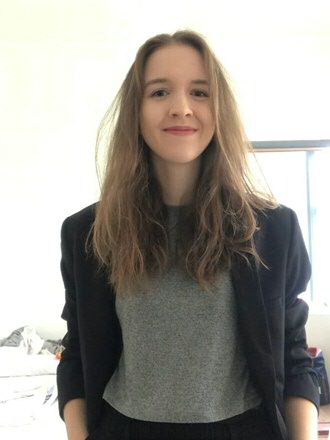
Minor in Development Studies at the University of Groningen
Helena Nielsen
Given the Corona situation, I also had to stay in the Netherlands for my minor and, instead of doing an exchange, stayed at the University of Groningen.
The Development Studies program is an interfaculty minor, meaning, the courses are offered by different UG faculties, providing a holistic perspective on this complex subject. I was interested to learn more about development work, its history, ethical implications, and the power dynamics that play into it. Who has the right to define what development means, and how do our perceptions of the term change given the reality of climate change? I was also excited to take part in the program’s summer school that is conducted every year in Tanzania and where you can observe how the theory plays out in practice.
During the six-month program I took the following courses:
- Environment & Development
- Ethnicity, Culture, Politics
- Climate Change, End Times and Sustainable Futures
- Global Development Studies
- Topical Themes in Development
- Reading Seminar: Key Debates in Development Studies
All of the courses were very interesting and offered a good mix of theoretical and applied knowledge. In the Reading Seminar we had insightful discussions in small groups similar to the set up at UCF, while we received weekly coachings in Topical Themes to write our own development studies research paper. My favourite course was the ‘Climate Change, End Times and Sustainable Futures’, which taught me a lot about cultural conceptualisations of climate change and their historical roots in religious texts or indigenous narratives. We also learned about eco-anxiety, and I got to write an essay about the reception of apocalyptic themes in movies about natural disasters.
While I enjoyed the contents of the program, the biggest benefit to the program was living in Groningen. The city is the definition of a vibrant student city and I loved experiencing the ‘big UG’ life there, making use of all the university facilities, but also the cafés, restaurants and events. The somewhat lighter workload (compared to UCF) allowed ample time to do so :)
Marc Flessa - minor at another university
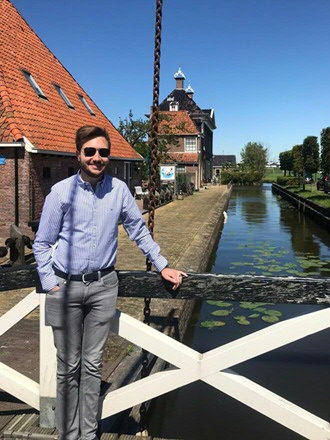
Minor in Global Affairs at Campus The Hague, University of Leiden
Marc Flessa
Sometimes in life, one door closes and another opens, and this is exactly what happened to me in regards to my minor. My original plan was to spend my minor abroad, at the Australian National University in Canberra. I considered it a unique opportunity to gain deep personal and academic experience. My excitement was immense. However, as for so many other students, the COVID-19 pandemic interfered with my plans. I can not deny that I was devastated.
In the end I decided to do my minor in the Netherlands. The program I chose is called Global Affairs and is offered by the University of Leiden at their The Hague Campus. Given my long-lasting fascination for International Politics, I was convinced that this program could greatly enrich my regular studies. In the end, it did much more. Despite all circumstances my minor has been outstandingly influential for my (academic) career and development. Courses like Geo-Economics or Humanitarian Intervention and Peacebuilding were highly interesting and compelling. Moreover, the lecturers and guest lecturers with all their professional and academic experience could not only greatly convey the topics’ content but also showed what International Politics means in practice. Furthermore, my study time at a different academic institution also helped to further develop and refine my academic (writing) skills. I dare to say that this experience has surely been defining for my future academic career. My wish to further study and work in this field has been grounded in the experiences in my minor. In practice, I am actually going to study a master program in International Relations.
In conclusion, born out of a missed opportunity, my study time in The Hague with the minor Global Affairs has been an academically challenging but deeply fascinating and influential experience. Looking at it from hindsight, Australia would have surely been great, but regarding my academic and professional development, there could have been no better choice than studying Global Affairs.
UCF within the University of Groningen
University College Fryslân (UCF) is an integral part of the faculty of Campus Fryslân (CF) and the larger University of Groningen (UG). CF is a connected knowledge institution with five research departments related to societal themes in- and outside the region, ranging from big data to regenerative agriculture. As an undergraduate, you will therefore have the unique opportunity to work closely together with academics from all levels and participate in research!
More information
-
Check the course catalogue for detailed course descriptions
| Laatst gewijzigd: | 01 augustus 2024 09:39 |
